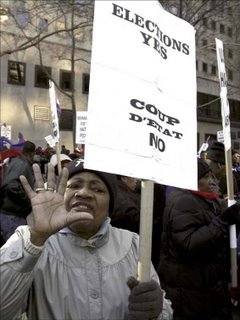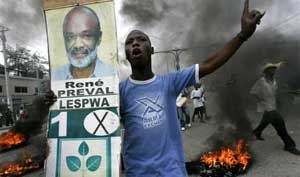53 Haiti: Elections Under Occupation
A week later, the results of Haiti's first ostensibly "democratic" presidential election since the ousting of democratically-elected president Jean-Bertrand Aristide are still indeterminate. Why is that?

image by Dominique Esser from HaitiAction.org
As Brian Concannon reports on HaitiAction.net
René Preval, who, in the most recent reported count, won 48.76% of the vote with 90% of the ballots counted, is calling for an inquiry into the election, charging fraud:

Pro-Preval and anti-imperialist demonstrations continue despite the repressive tactics of the occupying force (consisting of approximately 7,300 U.N. troops and 1,750 international police). One person was brutally killed when "peacekeepers" opened fire on a demonstration yesterday.
Under conditions of ongoing occupation (now entering its third year, as we near the second anniversary of the coup in which democratically elected president Jean-Bertrand Aristide was ousted by a coalition of imperialist nations) how can elections be anything but anti-democratic? In nations that support the occupation, the Haitian elections are trumpeted as a sign of democracy returning to Haiti; but democracy is not compossible or compatible with occupation.
Brazilian Juan Gabriel Valdés, commander of MINUSTAH (the Brazilian-led UN "security" force in Haiti) and Special Representative of the UN Secretary-General, remarked to an Associated Press reporter that “If you have had elections in Iraq and in Afghanistan, I don't see why you can't have elections in this country. Elections are not only positive but indispensable.”
The comparison is instructive: in all three cases, elections are a tactic callously used by the occupying force to evince the supposed democratic order it has "restored" to the occupied region. The thing is, the occupying force didn't depose a dictator or an oppressive regime in Haiti, like it did -- still problematically -- in Iraq and in Afghanistan; it deposed a democratically elected president, who had a mandate which he won with over 90% of the vote. Meanwhile MINUSTAH force is perpetrating human rights abuses and securing the region for lucrative "reconstruction" projects which make billions for foreign capital. The majority of MINUSTAH's victims have been unarmed civilians (especially in marginalized neighbourhoods like Cité Soleil) and dissidents. There are hundreds of political prisoners in Haiti, many of whom are being held without trial, contrary to stipulations in Haiti's constitution and to internationally recognized human rights convention.
A recent Harvard Law School Report on the UN presence in Haiti, quoted in LiP Magazine, concluded that
Providing the implements of repression while claiming to restore democracy? That is an unforgivable tension. And any claim that the U.S., Canada, Brazil, and other nations making up the occupying force, are bringing democracy to Haiti is -- perhaps in this occupation, more than in any other -- a callous lie.
So if it wasn't to make Haiti more democratic, why was Aristide deposed in a coup organized by the U.S., France, Canada, and other nations?

Back in January 2004, Peter Hallward in The Guardian argued that
For Canadians who like to regard themselves as the world's peacekeepers, not as the world's imperial invaders, Canada's role in all this should give them pause:
The oppression of Haitians means unregulated, hyperexploited labour, access to resources, lucrative reconstruction contracts spun as "aid," cheap t-shirts -- a familiar story.
But popular resistance -- both inside Haiti and around the world -- continues. After all, resistance to oppression is Haiti's legacy:
So much for teaching democracy to Haiti. One might say that they invented it, at least in this hemisphere.
"Haiti's elections on February 7 went well enough that the post-election vote counting should have been uncontroversial. The turnout was huge, there was almost no violence, and the people's choice was so clear that the second place finisher received less than 12% of the vote. But incredibly, a week later the final results have not been declared, and the Electoral Council is in disarray. The voters have taken to the streets to protect their vote, and the clear winner is alleging fraud"
René Preval, who, in the most recent reported count, won 48.76% of the vote with 90% of the ballots counted, is calling for an inquiry into the election, charging fraud:
We are convinced that either massive fraud or gross errors stain the (electoral) process" Preval said earlier in the day, adding that the official results "do not correspond with reality."

A pro-Preval demonstrator. Image from La Patria
Pro-Preval and anti-imperialist demonstrations continue despite the repressive tactics of the occupying force (consisting of approximately 7,300 U.N. troops and 1,750 international police). One person was brutally killed when "peacekeepers" opened fire on a demonstration yesterday.
Under conditions of ongoing occupation (now entering its third year, as we near the second anniversary of the coup in which democratically elected president Jean-Bertrand Aristide was ousted by a coalition of imperialist nations) how can elections be anything but anti-democratic? In nations that support the occupation, the Haitian elections are trumpeted as a sign of democracy returning to Haiti; but democracy is not compossible or compatible with occupation.
Brazilian Juan Gabriel Valdés, commander of MINUSTAH (the Brazilian-led UN "security" force in Haiti) and Special Representative of the UN Secretary-General, remarked to an Associated Press reporter that “If you have had elections in Iraq and in Afghanistan, I don't see why you can't have elections in this country. Elections are not only positive but indispensable.”
The comparison is instructive: in all three cases, elections are a tactic callously used by the occupying force to evince the supposed democratic order it has "restored" to the occupied region. The thing is, the occupying force didn't depose a dictator or an oppressive regime in Haiti, like it did -- still problematically -- in Iraq and in Afghanistan; it deposed a democratically elected president, who had a mandate which he won with over 90% of the vote. Meanwhile MINUSTAH force is perpetrating human rights abuses and securing the region for lucrative "reconstruction" projects which make billions for foreign capital. The majority of MINUSTAH's victims have been unarmed civilians (especially in marginalized neighbourhoods like Cité Soleil) and dissidents. There are hundreds of political prisoners in Haiti, many of whom are being held without trial, contrary to stipulations in Haiti's constitution and to internationally recognized human rights convention.
A recent Harvard Law School Report on the UN presence in Haiti, quoted in LiP Magazine, concluded that
“MINUSTAH has provided cover for abuses committed by the HNP [Haitian police] during operations in poor, historically tense Port-au-Prince neighborhoods such as Bel-Air, La Saline, and lower Delmas. Rather than advising and instructing the police in best practices, and monitoring their missteps, MINUSTAH has been the midwife of their abuses. In essence, MINUSTAH has provided to the HNP the very implements of repression.”
Providing the implements of repression while claiming to restore democracy? That is an unforgivable tension. And any claim that the U.S., Canada, Brazil, and other nations making up the occupying force, are bringing democracy to Haiti is -- perhaps in this occupation, more than in any other -- a callous lie.
So if it wasn't to make Haiti more democratic, why was Aristide deposed in a coup organized by the U.S., France, Canada, and other nations?

Aristide, March 2, 2004: "I call it a coup d'état."
Back in January 2004, Peter Hallward in The Guardian argued that
[Aristide] remained indelibly associated with what's left of a genuine popular movement for political and economic empowerment. For this reason alone, it was essential that he not only be forced from office but utterly discredited in the eyes of his people and the world. As Noam Chomsky has said, the "threat of a good example" solicits measures of retaliation that bear no relation to the strategic or economic importance of the country in question. This is why the leaders of the world have joined together to crush a democracy in the name of democracy.("Why they had to crush Aristide" by Peter Hallward in The Guardian, January 2004):
For Canadians who like to regard themselves as the world's peacekeepers, not as the world's imperial invaders, Canada's role in all this should give them pause:
"There appears to be blood all over Canada's hands: first because it was on board for the removal of Aristide and second because it is supporting, both politically and financially, an illegitimate government that appears dead set on violently crushing any opposition. It also has a contingent of some 125 police officers who train the Haitian National Police accused of massacring civilians. And yet, the fate of the poorest nation in the Western Hemisphere, perfectly situated between Fidel Castro's Cuba and Hugo Chavez's Venezuela, sweatshop armpit to Canadian T-shirt manufacturers, the mine pit to Canadian copper companies, is scarcely discussed or covered by Canadian media.""We Turned our Back on Haiti",Toronto Star
The oppression of Haitians means unregulated, hyperexploited labour, access to resources, lucrative reconstruction contracts spun as "aid," cheap t-shirts -- a familiar story.
But popular resistance -- both inside Haiti and around the world -- continues. After all, resistance to oppression is Haiti's legacy:
In spite of horrific repression, Haitians remain conscious of their country’s heritage as the first free black republic, and, despite repeated police shootings of non-violent protestors, regularly march in the thousands to demand Aristide’s return. It is entirely apt that soon after being forced into exile, Aristide referred to the “tree of liberty”: As the slave general and hero of Haitian independence Toussaint l’Overture declared upon his forced removal two hundred years earlier, “In overthrowing me, you have cut down in San Domingo only the trunk of the tree of black liberty. It will spring up again by the roots, for they are numerous and deep.”"The Roots of Liberty: Repression and Resistance in Haiti" by Ben Terrell in LiP magazine
So much for teaching democracy to Haiti. One might say that they invented it, at least in this hemisphere.

0 Comments:
Post a Comment
<< Home